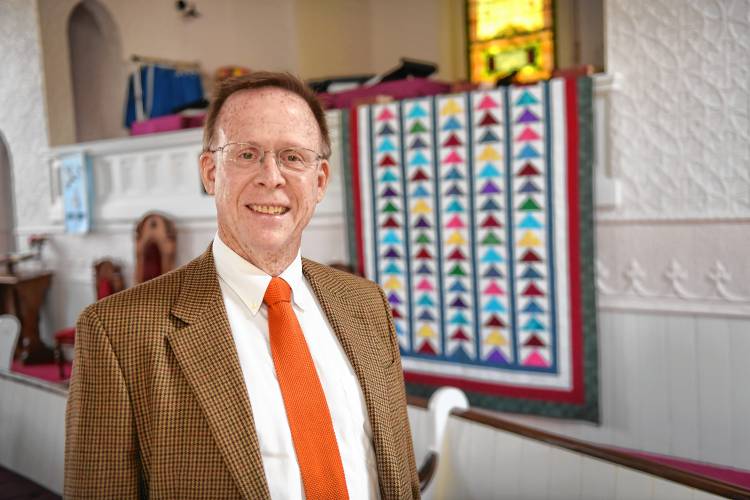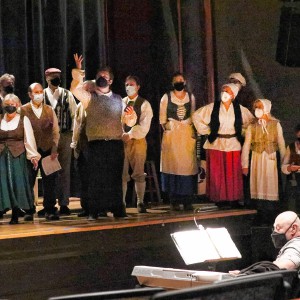Faith Matters: An alternative to anger and hatred: Hatred blinds people so that they can only see evidence that supports their beliefs

The Rev. Randy Calvo in the First Congregational Church of Sunderland, United Church of Christ. STAFF PHOTO/PAUL FRANZ
| Published: 10-04-2024 9:18 PM |
Today is Oct. 5. Election Day is Nov. 5.
A recent survey found that 90% of Americans can name a recent news event that made them angry while only 50% could name something that made them proud. This is a worrisome comparison of numbers as we approach Election Day. The numbers seem to indicate that we are less proud of being American than we are angry at others who are not American like us.
Anger is a strong motivator to constructive action. Anger with our national failures to live into the original ideal that “all men are created equal,” for example, has fueled necessary and beneficial change. It outweighs the costs of challenging and changing an unjust status quo. However, anger only for the sake of anger can degenerate into hatred.
Sabrina Haake has written that hatred becomes a powerful addiction. Even worse, a shared addiction to hatred forms a strong social bond because listening to someone spew hatred triggers the same reaction as if you were spewing hatred yourself. Hatred blinds people so that they can only see evidence that supports their beliefs. Hatred self-sustains and thrives on division not diversity as it ignores or denigrates those judged to be others. Intractable hatred feeds anger, and anger feeds hatred, and the cycle repeats and intensifies.
What are the bounds of this anger and hatred? Is it to unfriend an old friend, to let vitriol replace debate? Is it to deface a neighbor’s political sign, to troll strangers who are different? Is it to disenfranchise unwanted voters, to threaten physical violence and retribution? Is it to gleefully speak of executing political opponents? Is it another assassination attempt? Is it even worse? If we’re caught in this anger-hatred-spiral, our useful energy is exhausted.
This election year is also the 200th anniversary of the discovery of the Second Law of Thermodynamics. The First Law of Thermodynamics is about the conservation of energy. The Second Law is about entropy, or disorder. Order will always give way to increasing disorder. As a straightforward example, an egg moves from whole to broken, but will never move from broken to whole.
Since there is only so much energy in all of creation, and since order requires useful energy, cosmologists predict the universe will eventually exhaust all useful energy, leaving eternal, boring subatomic uniformity. Such uniformity is the living death of everything. Uniformity is an excruciatingly boring goal toward which to aspire. Also, this vast but limited useful energy reveals a warning to us, and not for 1.7-times-10106 years in the future, but for now. Why squander the useful energy available to us on the unproductive anger-hatred-cycle that for some reason idolizes uniformity?
Instead, I’d like to share the warning revealed in the Gospel of Mark. Jesus has declared for the second time that he will be rejected in Jerusalem, die and rise again. (9:30-31) The disciples, his closest followers, do not dare to ask any of their questions. Instead, among themselves they begin to argue over the implications of Jesus’ revelation. They each insist that they are the greatest. They must be assuming that “rise again” references the promised Messianic earthly kingdom, and they are jockeying for power. Jesus puts an immediate end to this.
Article continues after...
Yesterday's Most Read Articles
Purposefully, Mark then tells the reader that the corporately chastened disciples now direct their combined sense of prerogative against an outsider. They report to Jesus that they had confronted a man who was doing the good work of healing in Jesus’ name, but who was not one among them. It wasn’t that he was doing wrong; it was that he wasn’t doing it as one of them.
Instead of being commended by Jesus for protecting the integrity of the group, the teacher insists, “‘Whoever is not against us is for us.’” (9:40) This is a broad expansion of belonging and it must have upended the thinking of the disciples.
Mark’s story warns us about the human inclination toward self-pride and group-think, and offers Jesus’ unexpected words of intentional acceptance as an escape from that destructive cycle. Rather than anger and hatred and separation, Jesus urges acceptance. Rather than the dullness of uniformity there is the breadth of “‘Whoever is not against us is for us.’”
We are the world’s longest-lived constitutional democracy because we have hoped, failed, and then tried again to honor the vote. We should have learned by now that democracy is contentious, but it works. The vote allows us to disagree constructively. Deny the vote and disagreements become destructive.
The Constitution’s First Amendment guarantees the freedoms of speech, press, assembly and petition. These make obvious that to protest is thoroughly American, that autocratic power is not. And the first of those First Amendment freedoms is religion. When there is no state religion imposing putative divine truths, then people are free to discover and advocate for their own opinions. It is then the almost sacred responsibility of the nation and its people to protect this right to think and disagree, to advocate and vote, peaceably. This moves us away from anger and hatred, and toward being proud as Americans.
The First Congregational Church of Sunderland, United Church of Christ, has ministered to our local communities since 1717. Sunday Services begin at 11 a.m. The church’s website and Facebook page are found under First Congregational Church of Sunderland. The church’s phone number is 413-665-7987. If you wish to reach Rev. Randy Calvo, email him at randyc1897@gmail.com. We offer religious education for the youth and Bible study for adults. Anthony Tracia directs our music program, and we have a bell choir. We are an official “Open and Affirming” congregation so when we say, “All are welcome here,” we mean it.






 Highlighting ‘community and beauty’: ‘Welcome Yule’ performers taking stage in Turners Falls for 40th year
Highlighting ‘community and beauty’: ‘Welcome Yule’ performers taking stage in Turners Falls for 40th year Heath woodworker awarded $25K fellowship
Heath woodworker awarded $25K fellowship Ashfield Historic Museum curator adding Indigenous exhibits to decolonize collection
Ashfield Historic Museum curator adding Indigenous exhibits to decolonize collection Nature Photo Contest
Nature Photo Contest
